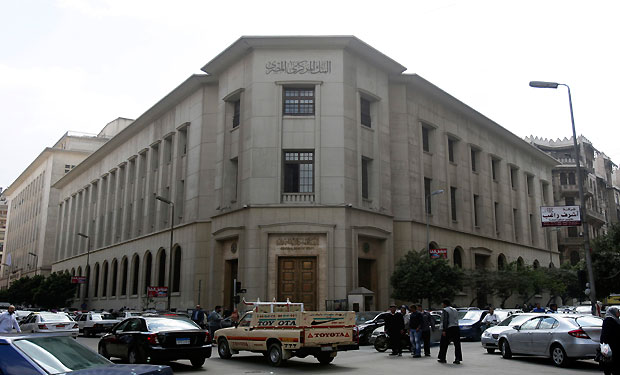
File photo of people and vehicles are seen caught in a traffic jam in front of the Central Bank of Egypt’s headquarters in downtown Cairo. (Reuters/Amr Abdallah Dalsh)
Cairo, Asharq Al-Awsat—The Egyptian cabinet has approved an additional EGP 22.3 billion (USD 3.2 billion) in spending on investment projects in a bid to boost the economy over the forthcoming ten months, according to Deputy Prime Minister Ziad Bahaa El-Din.
The military-backed interim government in Cairo is seeking to restore confidence in the economy following two popular uprisings over the past three and a half years. Despite significant financial assistance from Gulf states following President Mohamed Mursi’s ouster earlier this year, the Egyptian economy remains troubled. The recent violence in the country has only made things worse, with a national curfew striking a severe blow to many businesses.
Bahaa El-Din said that the new investments will be aimed towards labor-intensive projects and services that help the poor. This will include building railways, roads and bridges, in addition to the construction of 131 potable water and sewage treatment plants. Cairo’s transportation networks, including the metro system are also set to be revamped.
The government projects that the increased spending will boost growth to 3.5 percent in the 2013/14 fiscal year, compared to growth rates of just 2.2 percent last year, according to Planning Minister Ashraf Al-Arabi.
He added that the government also intends to avoid raising taxes or cutting spending to reduce the country’s escalating budget deficit.
The additional EGP 22.3 billion investment will bring total government investment in this year’s budget to EGP 120 billion.
Saudi Arabia, Kuwait and the United Arab Emirates have pledged a total of USD 12 billion to Egypt in loans, grants and fuel shipments following Mursi’s ouster. However, the United States and Europe have threatened to cut off vital financial aid and halt security cooperation with Egypt in light of the violence that has swept the country.
Egypt’s finance minister, Ahmed Galal, announced that since the beginning of 2013, nearly half of the government’s spending is deficit spending.
He also revealed that the government has also been helped by a decrease in interest rates since the Arab aid arrived, reducing the cost of servicing its debt by between 2 and 2.5 percent.
The Egyptian government also announced plans to double the number of new low-income homes scheduled for completion this year from 50,000 to 100,000. Utilities will be extended to 36 separate industrial zones, including many in southern Egypt, with the objective of attracting 4,000 projects and providing 450,000 new jobs.
